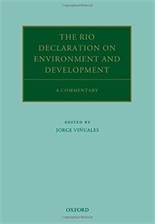Author
Jorge E. Viñuales (editor)
Publication Year
2016
Source
Oxford University Press
720 pages
Series
Oxford Commentaries on International Law
The international community has long grappled with the issue of safeguarding the environment and encouraging sustainable development, often with little result. The 1992 Rio Declaration on Environment and Development was an emphatic attempt to address this issue, setting down 27 key principles for the international community to follow. These principles define the rights of people to sustainable development, and the responsibilities of states to safeguard the common environment. The Rio Declaration established that long term economic progress required a connection to environmental protection. It was designed as an authoritative and comprehensive statement of the principles of sustainable development law, an instrument to take stock of the past international and domestic practice, a guide for the design of new multilateral environmental regimes, and as a reference for litigation.
This commentary provides an authoritative and comprehensive overview of the principles of the Declaration, written by over thirty inter-disciplinary contributors, including both leading practitioners and academics. Each principle is analysed in light of its origins and rationale. The book investigates each principle’s travaux pr?paratoires setting out the main points of controversy and the position of different countries or groups. It analyses the scope and dimensions of each principle, providing an in-depth understanding of its legal effects, including whether it can be relied before a domestic or international court. It also assesses the impact of the principles on subsequent soft law and treaty development, as well as domestic and international jurisprudence. The authors demonstrate the ways in which the principles interact with each other, and finally provide a detailed analysis of the shortcomings and future potential of each principle. This book will be of vital importance to practitioners, scholars, and students of international environmental law and sustainable development.
| TABLE OF CONTENTS |
Table of Cases xiii
Table of Treaties and Instruments xxi
List of Abbreviations xxxix
List of Contributors xIv
1. The Rio Declaration on Environment and Development: A Preliminary Study
Jorge E. Viñuales
2. The Philosophy of the Rio Declaration
Pierre-Marie Dupuy
3. Changing Conceptions of Environmental Risk
Jacqueline Peel
4. The Preamble of the Rio Declaration
Francesco Francioni
5. Principle 1: Human Beings and the Environment
Francesco Francioni
6. Principle 2: Prevention
Leslie-Anne Duvic-Paoli and Jorge E. Viñuales
7. Principle 3: From a Right to Development to Intergenenerational Equity
Claire Molinari
8. Principle 4: Sustainable Development through Integration
Virginie Barral and Pierre-Marie Dupuy
9. Principle 5: Poverty Eradication
Takhmina Karimova and Christophe Golay
10. Principle 6: Special Situation of Developing Countries
Mamadou Hébié
11. Principle 7: Common but Differentiated Responsibilities
Philippe Cullet
12. Principle 8: Sustainable Patterns of Production and Consumption and Demographic Policies
Christina Voigt
13. Principle 9: Science and Technology
Sandrine Maljean-Dubois
14. Principle 10: Public Participation
Jonas Ebbesson
15. Principle 11: Environmental Legislation
Martina Kunz
16. Principle 12: The Environment and Trade
Margaret Young
17. Principle 13: Liability and Compensation
Malgosia Fitzmaurice
18. Principle 14: Dangerous Activities and Substances
Makane M. Mbengue
19. Principle 15: Precaution
Antônio Augusto Cançado Trindade
20. Principle 16: The Polluter-Pays Principle
Priscilla Schwartz
21. Principle 17: Environmental Impact Assessment
Neil Craik
22. Principle 18: Notification and Assistance in Case of Emergency
Phoebe Okowa
23. Principle 19: Notification and Consultation on Activities with Transboundary Impact
Laurence Boisson de Chazournes and Komlan Sangbana
24. Principle 20: The Role of Women
Claire Mahon
25. Principle 21: The Role of the Youth
Magnus Jesko Langer
26. Principle 22: Indigenous People and Sustainable Development
Dinah Shelton
27. Principle 23: The Environment of Oppressed Peoples
Mara Tignino
28. Principle 24: The Environment in Armed Conflict
Marie-Louise Tougas
29. Principle 25: Peace, Development and Environmental Protection
Annyssa Bellal and Gilles Giacca
30. Principle 26: International Environmental Dispute Settlement
Timothy Stephens
31. Principle 27: Cooperation in a Spirit of Global Partnership
Peter H. Sand
Appendix: The Rio Declaration on Environment and Development
Index
About the author

Jorge E. Viñuales
Professor Jorge E. Viñuales holds the Harold Samuel Chair of Law and Environmental Policy at the University of Cambridge and is the Director of the Cambridge Centre for Environment, Energy and Natural Resource Governance (C-EENRG). He is also Of Counsel with Lalive and the Director-General of the Latin American Society of International Law.


